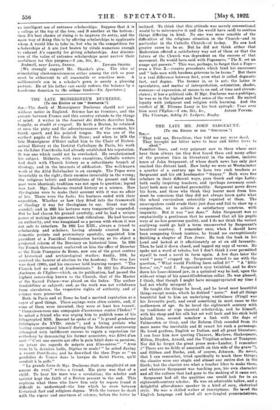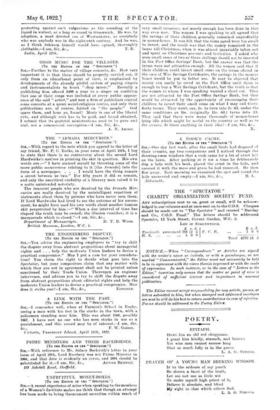THE LATE MR. JOHN SARGEAUNT.
(To THE EDITOR OF THE " S9ECTATOR."1
SIR,—
" They told sae, Heraclitus, they told me you were dead, They brought me bitter news to hear and bitter tears to shed."
Familiar lines, and very poignant now to those whose ears hear them always (as they first heard these and many other of the greatest lines in literature) in the mellow, incisive tones of John Sargeaunt, of whose death news has only just reached this distant land. How lucky we were at Westminster a quarter of a century ago to have two such teachers as Sargeaunt and his old headmaster " Gunny." Both were fine scholars in their different ways, pure Greek and ripe Latin; both really inspiring teachers, and (perhaps necessary -corol- lary) both men of marked personality. Sargeaunt never drove his form, and those who think they learnt most from him must be conscious that they did not always learn quite what the school curriculum ostensibly required of them. The unscrupulous could evade their just dues and fail to show up a composition, or to achieve a satisfactory construe, with impunity. But it was " not done." John Sargeaunt was so emphatically a gentleman that he assumed that all his pupils were of no less generous quality, and I do not think the veriest scallywag could go half a term unconverted by Sargeaunt's beautiful courtesy. I remember once, when I should have been composing Greek iambics, he found me surreptitiously finishing a chapter of Tom Jones. He took the book in his hand and looked at it affectionately as at an old favourite. Then he laid it down closed, and tapped my copy of verses. Ho spoke not a word of rebuke, but I don't think I ever permitted myself to read a novel in form again. A few days later the word " pony " cropped up. Sargeaunt turned to me with the question, " What would Fielding have called it?" "A ' little horse,' sir," said I. Sargeaunt's eyes twinkled, and he drew down his loose-skinned jaw, in a quizzical way he had, upon the wide-set wings of his quasi-Gladstonian collar. He was pleased, I think, that though I might have misappropriated my time I had not wholly misspent it.
He taught the things he loved, and he loved most beautiful things except music, which he dubbed " noise." And all things beautiful had to him an underlying wistfulness (Virgil was his favourite poet), and owed something in most cases to the mellowness of age. So he loved the eighteenth century with its traditions of ripe classical scholarship, and he himself, with his stoop and his silk hat set well back and his stick held behind him, seemed somehow a link with the days of. Palmerston or Grey, and the Reform Club sounded from its mere name the inevitable and fit resort for such a personage. He loved gardens, English or Italian, and all great literature. I can hear him now quoting Chaucer, Marlowe, Shakespeare, Milton, Dryden, Arnold, and the Virgilitun echoes of Tennyson. Nor did he forget the great prose men—Landor, I remember (" There are no fields of amaranth on this aide of the grave "), and Gibbon and Burke, and, of course, Johnson. He never, that I can remember, tried specifically to teach these things;. the classics were our staple and almost our entire diet in the Sixth; but the classics are what a teacher likes to make them, and whatever Sargeaunt was teaching you, his own character and all the culture that had gone to the making of it came out.
Sargeaunt had all the qualities one would look for in an eighteenth-century scholar. He was an admirable talker, and a delightful after-dinner speaker in a kind of easy, rhetorical style. He was a skilled writer of inscriptions. He laved the English language and hated all new-(angled pronenciatiens. protesting against such vulgarisms as the sounding of the liquid in walnut, or a long ee sound in Greenwich. He was, by adoption, a most devoted son of Westminster, as everybody who was anybody was in the eighteenth century. And he was, as I think Johnson himself would have opined, thoroughly



































 Previous page
Previous page